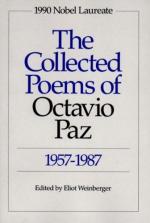|
This section contains 5,468 words (approx. 19 pages at 300 words per page) |

|
SOURCE: Clark, Timothy. “Renga: Multi-Lingual Poetry and Questions of Place.” SubStance: A Review of Theory and Literary Criticism 21, no. 2 (1992): 32-45.
In the following essay, Clark offers an analysis of Renga, a quadri-lingual poem written in April 1969 in Paris by Octavio Paz, Charles Tomlinson, Jacques Roubaud, and Edoardo Sanguineti.
One of the most adventurous, peculiar and thought-provoking poetic and theoretical enterprises of modern times has yet to receive its due. In April 1969, four poets gathered in the basement of a hotel in Paris. Then followed a week of collective writing, producing a quadri-lingual work, Renga, inspired by the Japanese renga, or “chain-poem.” Renga is written in the (Mexican) Spanish of Octavio Paz, the (British) English of Charles Tomlinson, the French of Jacques Roubaud and the Italian of Edoardo Sanguineti.
In Japan, a renga was a collective poem written according to a great number of apparently arbitrary rules, which each...
|
This section contains 5,468 words (approx. 19 pages at 300 words per page) |

|


